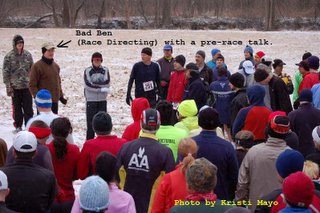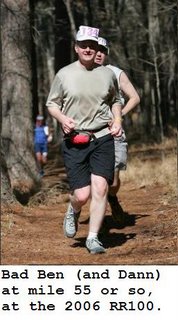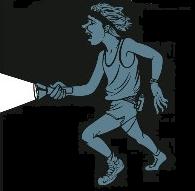
It's been a tough and busy two weeks. I ran a personal best 100-miler, and organized and race directed a trail race that had 3 distances, including a 50K. Of course, I had a LOT OF HELP.
Usually, my immune system gets somewhat compromised after a 100-miler. (Somehow, I've avoided getting sick, even though everybody around me has been sick for the last month). What may have helped this year is that I didn't start running until 10 full days after the event. I've been lifting and working out in the gym for a while since I got back, in lieu of running. Last night, I ran a fast and furious night trail run with Caleb, Shane, and Cody. I only did one 6-mile loop, though
 , and then had a nice hot bath and some homemade hot soup. Better not push a good thing. I really wanted to go for two, though.
, and then had a nice hot bath and some homemade hot soup. Better not push a good thing. I really wanted to go for two, though.By the way, on this last 100-miler, I used Clif Bloks as my main caloric intake for the 1st 40 or 50 miles or so. Cran-Razz was my favorite flavor. They worked great! Somehow, I eased through the "bonk" of the "glycogen to fat-burning wall" that I usually experience between miles 25 and 35. (I usually have a tough hour or so somewhere within that mileage range). After I got tired of the Clif Bloks, I switched to "real food." I was craving protein. I didn't use Boost, like I usually do. It just didn't sound appealing, at the time. The "real food" that I ate was PB & J sandwich slices, chicken noodle soup, potato soup, canteloupe slices, boiled potato slices, orange slices, and a little bit of mac & cheese.
Something else I did differently: I had 2 Tylenol at about mile 65 instead of Advil, to reduce swelling, especially in my feet. I had two more at mile 90. I didn't have any more pain relievers for another 35 hours. (I don't like to use them). During the race, I also kept up with my electrolytes with SUCCEED! capsules, as needed. Knowing when and how often to take them is a good thing. For me, it's based on sweat output and hand swelling. I don't usually get to the point of calf cramps to realize I need electrolytes. I also drank about 4 bottles of Clip2 Sports drink before switching completely to water within the first 35 miles. (I alternated between water and Clip2 to that point).
Eating right is very important in a 100-miler. Here's an explanation of why:
You cannot take-in enough calories during the event to sustain your effort. Your liver runs out of glycogen within 20-30 miles. Your body's own fat has to be fuel from then on, so you have to stay within your body's "fat burning range" for the entire distance. This is usually about 75 to 85% the effort you put-out in a marathon. To complete a 100-miler, you have to learn to run at that 75-85% effort the whole race. If you run faster, you will use energy faster than your body can convert the fat and bonk harder than you have ever known to in any marathon, believe me. Your food intake during the race needs to be steady. You will need carbs and some protein to help your body consume its own fat. Sometimes you won't feel like eating, but you have to force yourself to! That's why it's VERY important to learn what you can eat (and keep down) for 20 or more hours straight.
My splits were fairly even at RR100. I had to artificially hold myself back, so that I would have even splits and a strong finish. One young friend of mine (from KC), didn't hold back for the first 30 miles or so. He DNF'd, even th
 ough (compared to me) he was 20-years younger, 70 pounds lighter, well prepared, and in much better running shape. I caught him by mile 40, at the main aid station. He ended up DNF'ing at mile 77 due to being extremely cold, and not being able to warm up. This is a classic sign of running out of fuel. He was flirting with hypothermia, even though it was only 30F or so, and he had 5 jackets on.
ough (compared to me) he was 20-years younger, 70 pounds lighter, well prepared, and in much better running shape. I caught him by mile 40, at the main aid station. He ended up DNF'ing at mile 77 due to being extremely cold, and not being able to warm up. This is a classic sign of running out of fuel. He was flirting with hypothermia, even though it was only 30F or so, and he had 5 jackets on.Experience and training got me through the 100 with a PR. Now I'm (finally) using my mind and all of my experience for a successful recovery.
Sometimes I do learn from past mistakes!


9 comments:
You've definitely had a busy two weeks, but I know noone who is more prepared to handle the presure! Good info on eating while running a race.
J
You are soo good with recovery! And your calorie imput is very helpful! I need to learn to pay more attention to my food intake.
You are soo good with recovery! And your calorie imput is very helpful! I need to learn to pay more attention to my food intake.
very cool post - good advice and thoughts from an experienced ultra-veteran! i'll be printing it out and putting it in my "notes on runs" folder.
I agree with Angie - thanks for the tips. A lot of us will benefit from them.
A ran a VERY smart race, with your head and body. I don't use gus anymore, I have much better luck with the ClifBloks.
thanks for this post ben! This will definitely come in handy for my first 50 miler at the end of the year!
Wow! I've read most of the information you shared in your post before, but the way you wrote it and related it just made more sense to me. I've never heard the "wall" described that way, and I now know I have experienced it on my ultras and why I felt good after it. I want to remember this one, thanks!
It's great how much detail is provided about fueling strategies for ultramarathons.
Post a Comment